| Srl | Item |
| 1 |
ID:
122433
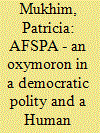

|
|
|
|
|
| Publication |
2013.
|
| Summary/Abstract |
The Armed Forces Special Powers Act (AFSPA) dates back to 1958
when it was passed by the Indian Parliament to quell the Naga rebellion
in a so-called disturbed area. Later it was extended to the states
of Assam, Manipur, Tripura, parts of Meghalaya and Arunachal Pradesh
and later to Jammu and Kashmir in 1990. This Act is a legacy of a
colonial power. The Armed Forces (Special Powers) Ordinance, 1942,
was used by the British to quell dissent during the Second World War.
But even before that it was used as an instrument of repression which
led to the Jallianwala Bagh massacre. It is ironic that a free country
would be waging a war against its own people using all forms of
brutality to secure the nation-building agenda of the State. Why else
would you use the military for an internal rebellion?
|
|
|
|
|
|
|
|
|
|
|
|
|
|
|
|
| 2 |
ID:
129753
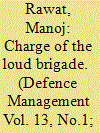

|
|
|
| 3 |
ID:
104718
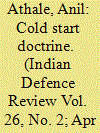

|
|
|
| 4 |
ID:
141503
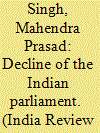

|
|
|
|
|
| Summary/Abstract |
Indian Parliament had a very promising start and worked well during the1950s-1960s. During the 1970s Parliament was squeezed by a great extra-parliamentary mass movement against authoritarianism and corruption and partial but crippling subversion of parliamentary-federal Constitution during the national emergency. Democracy was restored following the 1977 general elections. But the general decline of Parliament that set in the post-Nehru era has not yet been reversed. Major indicators of this decline are shortening sessions, time lost due to disruptions in proceedings by the opposition and violation of norms and precedents by the government, rampant absenteeism, actual hours of sitting as a percentage of available hours, phenomenon of weak legislative federalism via Rajya Sabha in the overall setting of parliamentary-federalism, challenges of new extra-parliamentary mass movements, and judicial activism. The new committee system introduced since 1993 is a welcome development. However, the parliamentary reforms recommended by the constitutional review commission (2002) remain unimplemented.
|
|
|
|
|
|
|
|
|
|
|
|
|
|
|
|
| 5 |
ID:
155452


|
|
|
|
|
| Publication |
Gurgaon, Penguin Random House India Pvt Ltd, 2017.
|
| Description |
x, 313p.hbk
|
| Standard Number |
9780670089437
|
|
|
|
|
|
|
|
|
|
|
|
Copies: C:1/I:0,R:0,Q:0
Circulation
| Accession# | Call# | Current Location | Status | Policy | Location |
| 059212 | 355.02/MAC 059212 | Main | On Shelf | General | |
|
|
|
|
| 6 |
ID:
129736


|
|
|
| 7 |
ID:
118081


|
|
|
| 8 |
ID:
107439
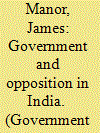

|
|
|
|
|
| Publication |
2011.
|
| Summary/Abstract |
Interactions between ruling and opposition parties in India have long been sorely neglected by political analysts. This study finds clear contrasts between interactions at national and state levels in this federal system, and further, often marked variations across the 28 states - each of which has its own Westminster-style legislature. Government-opposition relations range from semi-civilized to caustic, although most cases are situated some at distance from those extremes. So, despite a recent confrontation in the Indian Parliament, there are no strong trends towards either deterioration or greater accommodation. This is a study in ambiguity.
|
|
|
|
|
|
|
|
|
|
|
|
|
|
|
|
| 9 |
ID:
132202
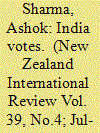

|
|
|
| 10 |
ID:
112550
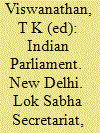

|
|
|
|
|
| Publication |
New Delhi, Lok Sabha Secretariat, 2011.
|
| Description |
vii, 90p.Hbk
|
|
|
|
|
|
|
|
|
|
|
|
Copies: C:1/I:0,R:0,Q:0
Circulation
| Accession# | Call# | Current Location | Status | Policy | Location |
| 056435 | 328.54/VIS 056435 | Main | On Shelf | General | |
|
|
|
|
| 11 |
ID:
104391
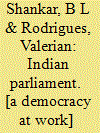

|
|
|
|
|
| Publication |
New Delhi, Oxford University Press, 2011.
|
| Description |
xv, 412p.
|
| Standard Number |
9780198067726, hbk
|
|
|
|
|
|
|
|
|
|
|
|
Copies: C:1/I:0,R:0,Q:0
Circulation
| Accession# | Call# | Current Location | Status | Policy | Location |
| 055997 | 328.5407/SHA 055997 | Main | On Shelf | General | |
|
|
|
|
| 12 |
ID:
118503
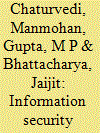

|
|
|